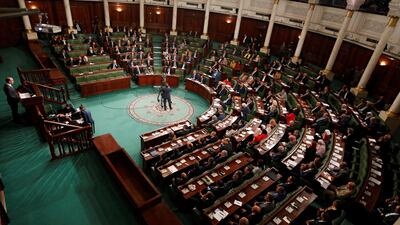At least five Tunisian parties plan to launch a vote of no confidence in parliamentary speaker Rached Ghannouchi, who has been accused of partisan interests.
Meanwhile, members of Mr Ghannouchi's Ennahda party have called for a new government, intensifying the country's political crisis.
The no-confidence motion poses the biggest challenge yet to Ennahda, which took power after the Arab uprisings but was forced to step down in 2013 after protests.
Pressure on the government has mounted in recent weeks after opponents called for the resignation of Prime Minister Elyes Fakhfakh over an alleged conflict of interest.
On Sunday, Ennahda, the main party in the ruling coalition, said it supported calls to change the government.
It said it wanted "to hold talks to form a strong new government because this government lost credibility after suspicion of conflict of interest involving the prime minister", said Imed Khmiri a senior official in Ennahda.
Mr Fakhfakh has rejected accusations of corruption after an independent member of Parliament published documents last month.
They indicated that companies in which the prime minister owns shares won deals worth US$15 million (Dh55.1m) from the state.
Mohammed Ammar, from the Attayar party, said a group of parliamentary blocs agreed to start the process of expressing a lack of confidence in the Speaker.
Among their reasons were poor management and unilateral decisions that served partisan interests.
The blocs include the Tahya Tounes, Attayar, Chaab and Reform parties, which are in the coalition with Ennahda.
The Free Constitutional Party led by Abir Moussi, a supporter of former president Zine El Abidine Ben Ali who was overthrown by the 2011 uprising, has campaigned to dismiss Mr Ghannouchi for weeks.
Mr Moussi's party accused him of serving the Muslim Brotherhood agenda and foreign allies, including Turkey and Qatar.
Mr Ghannouchi has rejected these claims, saying Tunisians want a government focused on economic and social policy, not political infighting.
Procedures for withdrawing confidence require the signature of 73 members of the house for it to be put to a public vote.
To succeed, 109 legislators will need to vote in favour. The five parties have about 90 members.

